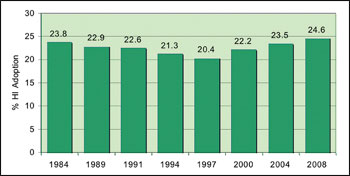Meniere’s Treatments: Diuretics
An important consideration when discussing the use of diuretics for Meniere’s disease, is that diuretics are “in addition to” not “instead of” salt restriction. The idea is that if the low salt diet is not working, then adding a diuretic might make the low salt diet more effective. The rationale behind adding a diuretic is explained on the Mayo Clinic website:
Your doctor may prescribe a medication to reduce fluid retention (diuretic), such as the drug combination triamterene and hydrochlorothiazide (Dyazide, Maxzide). Reducing the amount of fluid your body retains may help regulate the fluid volume and pressure in your inner ear. For some people a diuretic helps control the severity and frequency of Meniere’s disease symptoms.
One double-blind placebo controlled study, published in 1986, concluded that approximately 50% of a small group of Meniere’s patients reported a reduction in vertigo symptoms after taking Dyazide {{1}}[[1]]ORL J Otorhinolaryngol Relat Spec. 1986;48(5):287-92. Use of a diuretic (Dyazide) in the treatment of Menière’s disease. A double-blind cross-over placebo-controlled study. van Deelen GW, Huizing EH.[[1]]. Remember that Torok’s 1977 study revealed that about 60 to 80% of patients reported improvement regardless of treatment strategy. Here is the abstract to the above mentioned 1986 study:
Abstract
In 33 Menière patients (42 ears) the therapeutic effects of Dyazide (50 mg triamterene and 25 mg hydrochlorothiazide) were investigated in a cross-over placebo-controlled study. The hearing was measured by tone and speech audiometry whereas tinnitus and vertigo were recorded using fixed scales. In this study, Dyazide was found to have no significant effect on hearing or tinnitus. However, the vestibular complaints decreased significantly during the Dyazide treatment. Ears with a positive glycerol or furosemide test and ears with a fluctuating hearing loss did not show significant differences in hearing thresholds between the two periods in the trial. Of the 33 patients 17 had a distinct preference for Dyazide whereas 3 patients chose the placebo. The remaining 13 patients had no preference
A more recent Cochrane database review offered what is described as a Plain Language Summary of a review of journal articles pertaining to diuretics and Meniere’s disease:
“Diuretics for the treatment of Ménière’s disease or syndrome
Diuretics (drugs which reduce fluid accumulation in the body) are commonly used in the management of the symptoms of vertigo, hearing loss, tinnitus or aural fullness in patients with Ménière’s disease. ‘Endolymphatic hydrops’ is an increase in the pressure of the fluids in the chambers of the inner ear and is thought to be the underlying cause of Ménière’s disease. Diuretics are believed to work by reducing the volume (and therefore also the pressure) of these fluids. The authors of this systematic review carried out an extensive search but could not identify any randomised controlled trials of sufficient quality to include in the review. There is no good evidence about the effect of diuretics on the symptoms of Ménière’s disease and further research is needed”.
So, there you have it. While it makes perfect sense that a salt restricted diet and the use of diuretics should reduce fluid retention leading to Meniere’s attacks, no one has been able to prove it. Don’t ignore the other side of this equation either. Just because no one can prove it does not make it untrue. Completely confused?
The bottom line is that we believe (even if we can’t prove it) that fluid retention and Meniere’s attacks are connected. Neither a low salt diet, nor the use of a diuretic, are likely to have any significant negative impact, and probably helps some people.
Next week, we look at some less conservative, more expensive treatments for Meniere’s disease







